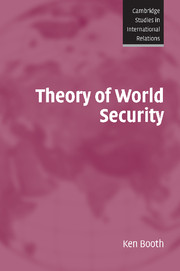Introduction
Published online by Cambridge University Press: 05 June 2012
Summary
The evidence is all around that the world has entered one of the most decisive phases of its history since the first recognisable humans (Homo erectus) moved around on two legs. Never before in this span of one and a half million years (with the contested exception of the danger of ‘nuclear winter’ during the Cold War) have we, the collective of global human society, been able to inflict as much decisive damage on each other and on the natural world on which we utterly depend; and never before have we, individually and in small groups, been as capable of transporting and visiting as much politically targeted destruction against those whose minds and actions we want to change. These realities alone would be enough to mark out our times as demanding a reconceptualisation of world security; but the threats to our safety are proliferating and growing in destructiveness. They include the multidimensional predicaments of globalisation, inflamed religious and cultural sensibilities, militant nationalism, growing disparities in life chances between the haves and the have-nots, the inexorable rise of the world's population (which will create future challenges that almost everybody today prefers to ignore), and on and on. The sheer quantity of issues threatening political turmoil, as Lenin might have said, has a quality all of its own. And yet this period of unprecedented historical change goes hand in hand with the persistence of traditionalist attitudes about world politics.
- Type
- Chapter
- Information
- Theory of World Security , pp. 1 - 8Publisher: Cambridge University PressPrint publication year: 2007

